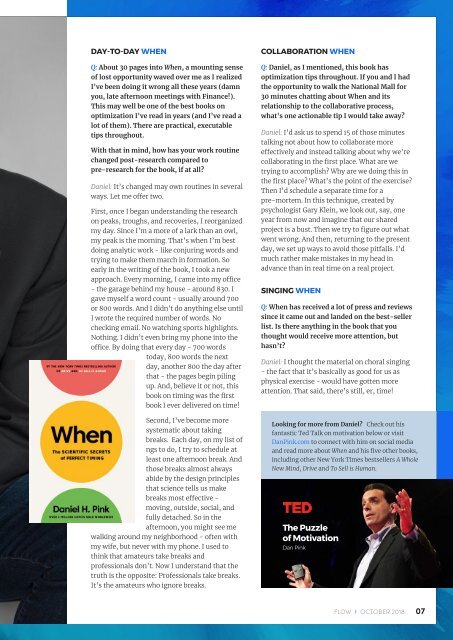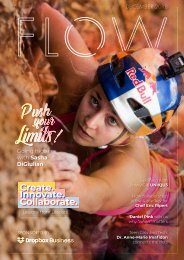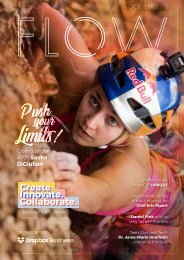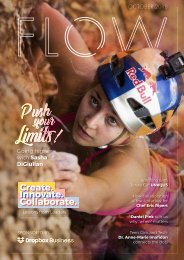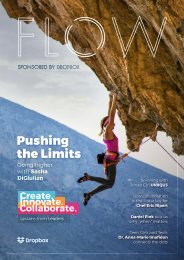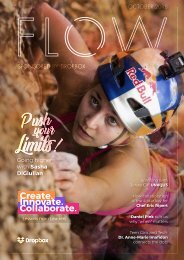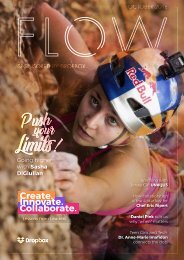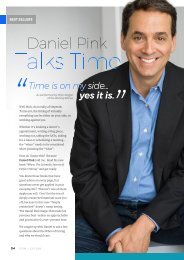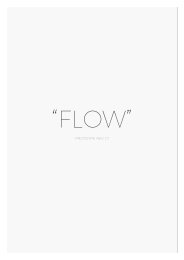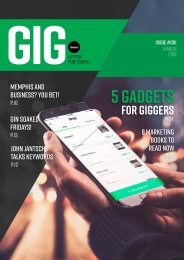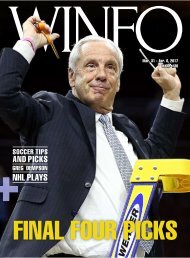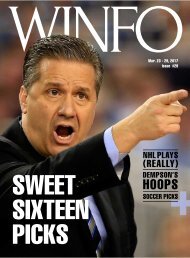WRC-Dropbox-October-02
WRC-Dropbox-October-02
WRC-Dropbox-October-02
Create successful ePaper yourself
Turn your PDF publications into a flip-book with our unique Google optimized e-Paper software.
DAY-TO-DAY WHEN<br />
Q: About 30 pages into When, a mounting sense<br />
of lost opportunity waved over me as I realized<br />
I've been doing it wrong all these years (damn<br />
you, late afternoon meetings with Finance!).<br />
This may well be one of the best books on<br />
optimization I've read in years (and I've read a<br />
lot of them). There are practical, executable<br />
tips throughout.<br />
With that in mind, how has your work routine<br />
changed post-research compared to<br />
pre-research for the book, if at all?<br />
Daniel: It’s changed may own routines in several<br />
ways. Let me offer two.<br />
First, once I began understanding the research<br />
on peaks, troughs, and recoveries, I reorganized<br />
my day. Since I’m a more of a lark than an owl,<br />
my peak is the morning. That’s when I’m best<br />
doing analytic work - like conjuring words and<br />
trying to make them march in formation. So<br />
early in the writing of the book, I took a new<br />
approach. Every morning, I came into my office<br />
- the garage behind my house - around 830. I<br />
gave myself a word count - usually around 700<br />
or 800 words. And I didn't do anything else until<br />
I wrote the required number of words. No<br />
checking email. No watching sports highlights.<br />
Nothing. I didn’t even bring my phone into the<br />
office. By doing that every day - 700 words<br />
today, 800 words the next<br />
day, another 800 the day after<br />
that - the pages begin piling<br />
up. And, believe it or not, this<br />
book on timing was the first<br />
book I ever delivered on time!<br />
Second, I’ve become more<br />
systematic about taking<br />
breaks. Each day, on my list of<br />
ngs to do, I try to schedule at<br />
least one afternoon break. And<br />
those breaks almost always<br />
abide by the design principles<br />
that science tells us make<br />
breaks most effective -<br />
moving, outside, social, and<br />
fully detached. So in the<br />
afternoon, you might see me<br />
walking around my neighborhood - often with<br />
my wife, but never with my phone. I used to<br />
think that amateurs take breaks and<br />
professionals don’t. Now I understand that the<br />
truth is the opposite: Professionals take breaks.<br />
It’s the amateurs who ignore breaks.<br />
COLLABORATION WHEN<br />
Q: Daniel, as I mentioned, this book has<br />
optimization tips throughout. If you and I had<br />
the opportunity to walk the National Mall for<br />
30 minutes chatting about When and its<br />
relationship to the collaborative process,<br />
what's one actionable tip I would take away?<br />
Daniel: I’d ask us to spend 15 of those minutes<br />
talking not about how to collaborate more<br />
effectively and instead talking about why we’re<br />
collaborating in the first place. What are we<br />
trying to accomplish? Why are we doing this in<br />
the first place? What’s the point of the exercise?<br />
Then I’d schedule a separate time for a<br />
pre-mortem. In this technique, created by<br />
psychologist Gary Klein, we look out, say, one<br />
year from now and imagine that our shared<br />
project is a bust. Then we try to figure out what<br />
went wrong. And then, returning to the present<br />
day, we set up ways to avoid those pitfalls. I’d<br />
much rather make mistakes in my head in<br />
advance than in real time on a real project.<br />
SINGING WHEN<br />
Q: When has received a lot of press and reviews<br />
since it came out and landed on the best-seller<br />
list. Is there anything in the book that you<br />
thought would receive more attention, but<br />
hasn’t?<br />
Daniel: I thought the material on choral singing<br />
- the fact that it’s basically as good for us as<br />
physical exercise - would have gotten more<br />
attention. That said, there’s still, er, time!<br />
Looking for more from Daniel? Check out his<br />
fantastic Ted Talk on motivation below or visit<br />
DanPink.com to connect with him on social media<br />
and read more about When and his five other books,<br />
including other New York Times bestsellers A Whole<br />
New Mind, Drive and To Sell is Human.<br />
The Puzzle<br />
of Motivation<br />
Dan Pink<br />
FLOW OCTOBER 2018<br />
~<br />
07


